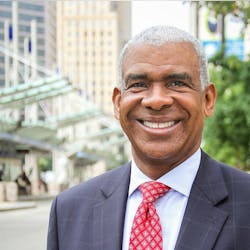SMART names Dwight Ferrell as its new general manager
Dwight Ferrell has been selected to be the new general manager of the Suburban Mobility Authority for Regional Transportation (SMART) in Detroit, Mich.
Ferrell’s hiring is the culmination of a national search started earlier this year to replace John C. Hertel. Ferrell will start at SMART on Sept. 20, 2021. Robert Cramer, SMART Deputy General Manager, who guided the authority throughout the pandemic, will remain in his leadership position.
Ferrell is a transit executive with nearly 40 years of industry experience with a strong operations background and a proven track record in improving service delivery and operational efficiency. He most recently served for four years as the CEO of Go Metro in Cincinnati, Ohio, and has held leadership positions at many of the nation's largest multi-modal public transit systems, including in Atlanta, Austin, Philadelphia and Dallas. He has also been active in various national transit associations, having served on multiple executive and industry boards influencing transit legislation and developing public policy.
“SMART was very fortunate to have attracted a diverse group of candidates from around the country. We are pleased to have found someone of Dwight Ferrell’s caliber to lead the authority as we transition out of the pandemic and determine how to best meet the needs of the region and create a system for the future,” said Khalil Rahal, chairman, SMART Board of Directors and Wayne County assistant county executive. “With Dwight’s wide-ranging transit industry experience and his focus toward rider-centric service, we hope to see a system that everyone will benefit from.”
Ferrell is a collaborative and engaging leader who has built and managed passenger-minded transit organizations and spearheaded transit density initiatives. Most importantly, he is ideally suited and committed to collaborating and engaging with the community SMART serves, local elected leaders and the Regional Transit Authority (RTA) for southeast Michigan to move public transit forward in the region.
“I am honored to have been selected to lead SMART as its next general manager and eagerly await working with the staff and talking with riders and other stakeholders to learn more about how SMART can continue to meet their evolving needs,” said Ferrell. “SMART has a great opportunity to reinvest in transit with tools and technology that ensures we are positioned to deliver the best possible service to our community every day.”
Ferrell comes to SMART at a crucial time as the authority shifts out of pandemic mode and adjusts transit services to better meet the changing demand of the workforce and for those who depend on transit.
Throughout the pandemic, SMART maintained its services for essential workers and trips, keeping its riders, drivers and staff safe and healthy. In March, SMART introduced Flex, an on-demand microtransit service in Dearborn, Troy and Hall Road corridor and over the last year made quarterly service changes to existing routes improving the network of routes as outlined in the SMART Path Plan.
Ferrell will be responsible for leading efforts to utilize the federal relief funds SMART received to aid it during the pandemic and to boost recovery efforts throughout the region. This federal investment will support innovative and flexible services and long-term financial sustainability, including projects such as the electrification of the fleet; expansion of microtransit services; and facility and capital improvements.
SMART has already implemented several bus improvements with the CARES Act funding, including the installation of Driver Safety Shields; Quantum Automated Wheelchair securement systems; on-board digital signs; and retrofitting seats with plastic inserts and transom windows.
Ferrell will oversee an approximately $200 million operating and capital budget with more than 800 employees. This amount includes the transit millage that supports SMART and is placed on local ballots for voter approval every four years. The next renewal vote is scheduled for August 2022.
